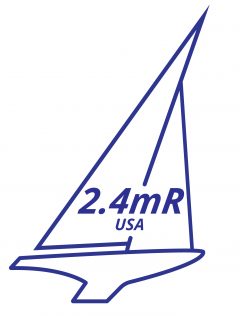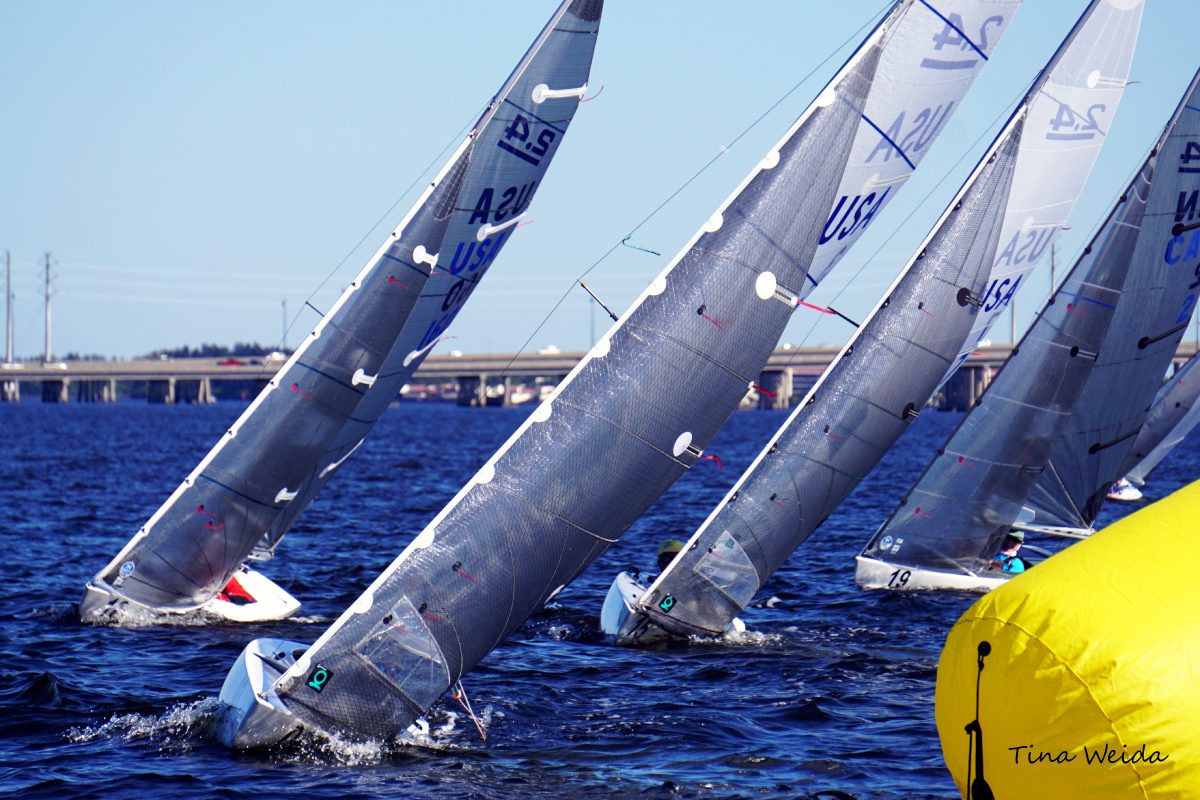The Judd Goldman Adaptive Sailing Association will be hosting the US Para Sailing Championships in conjunction with their annual Independence cup Thursday July 25 through Sunday July 28, 2019, at the Judd Goldman Sailing Center in Chicago IL. Click here for a link to the event
Month: April 2019
2018-2019 CanAm Wrap Up
Smith Wins The Finale and The 2019 2.4mR Can Am Championship Series
Increasingly Competitive North American 2.4mR Series Drives Class Growth
Port Charlotte, Fla. (April 2, 2019) – Can Am #5, also known as The Finale, closed out the winter racing season for the 2.4mR class on Charlotte Harbor with 21 competitors racing over three days (March 29-31).
Annapolis sailor Dee Smith, the current U.S. and North American Champion, crossed the finish first in eight of the nine races to take the win of The Finale. “The regatta was very good for everyone” said Smith. “The conditions were near perfect and there was a very good fight for second with Tony Pocklington beating out Allan Leibel on a tie break. The first two days were shifty and puffy. The second race on day two was a challenge with light air and the race that gave Tony the tie break. He was deep around the last mark and sailed around everyone to drift across the line for the win. For me, I just kept clear and sailed my race…I had good starts and went the right way, except that run in which I finished fourth and which became my drop race.”
With his string of first-place finishes, Smith ended the regatta with an insurmountable low score of eight points. He was followed in the final standings by Tony Pocklington, of Ft. Myers, Fla., and Allan Leibel of Toronto, Canada, each with 31 points. Two more Canadian sailors, Bruce Millar and Louise Anstey, who both hail from Victoria, B.C., each were second across the line in two races, and finished the regatta fourth and fifth with 33 and 39 points, respectively.
Anstey raced her first 2.4mR event in the Can Am series two years ago, having grown up sailing numerous one-design classes from El Toro dinghies to Fireballs, Lasers and Solings, as well as racing various PHRF keelboats. She started sailing a borrowed 2.4mR to be a sparring partner for Jackie Gay (who went on to win a Paralympic silver medal in the SKUD class). In her two years in the 2.4mR class, Anstey has observed that the racing in the Can Am series is getting much tighter.
“Those in the mid-fleet are pushing the leaders more and taking a few places away from them,” said Anstey. “The same is true of those who used to be a little farther back. I suspect the regular racing in a reasonable sized fleet that the 2.4mR Can Am Championship Series offers is a big factor in the increased competitiveness…and it remains friendly competition. I find the sailors in the class are helpful and willing to share information. It is the kind of support that makes me feel welcome and want to return for another event.”
The Finale was the fifth event in the 2019 2.4mR Can Am Championship which started last December. Over the course of the season 30 sailors, representing Canada, Guatemala, Norway, The Virgin Islands and the U.S.A., competed in one or more events. Open only to sailors racing the Norlin MkIII One Design, the Championship Trophy winner was determined from the results of all five regattas after his or her worst event was dropped from the scoring. Smith, who won three of the five events, came out on top. Bruce Millar, winner of the Edge Midwinters, followed by Allan Leibel, winner of Can Am #4, rounded out the top-three in the season championship standings.
“The fleet is getting stronger every regatta. Sailing in Port Charlotte is both challenging and warm. Everyone has a good time and the Charlotte Harbor Yacht Club does a great job,” concluded Smith.
Peter Wood, President of the Canadian class association and a long-time 2.4mR competitor concurred with Smith’s assessment of the competition and yacht club support, and also cited positive developments that came out of the season and which bode well for the class in future years. “First, there have been a number of new faces in the class including a group of sailors from Marblehead and a new sailor from Milwaukee whom we expect to see at regattas in Newport and Kingston [CAN] this summer,” said Wood. “The efforts by Bruce Millar and Tony Pocklington to further develop the jib boom rig for the 2.4mR will expand the population of sailors who can sail these boats. Bruce sailed a jib boom boat in the final regatta with good results.”
The continued support of the volunteers at Charlotte Harbor Yacht Club has also ensured that the fourth edition of the series – the 2020 2.4mR Can Am Championship Series – will return to Charlotte Harbor next winter.
“The Can Am series has helped bring the widespread North American 2.4mR fleet together,” said Tony Pocklington, President of the US 2.4mR class. “That consolidation has definitely motivated participation. We are very lucky to have a great venue for the Can Am Championship Series. Race committee, affordability, and race area are all perfect for our class, and help to showcase the technical, competitive aspects of the 2.4mR. Word of the consistent and competitive racing has spread, and we are seeing growth in the New England area, here in southwest Florida, and in Canada, specifically Victoria, Vancouver, and Toronto, where similar Can Am series (West and North) are being planned. Toronto is planning an inaugural event for this summer. Overall, the future is looking optimistic for our North American 2.4mR Norlin MkIII One Design class.”
Full results for Can Am #5, The Finale Regatta, may be found here; and full results for the earlier events in the season as available as well: 2018 2.4mR North American Championship may be found here; 2018 2.4mR U.S. Nationals results may be found here; 2019 Edge Midwinters results are here; and full results for Can Am #4 are here.
About the 2.4mR: The 2.4mR originated in 1983 in Sweden and attained confirmation as an international class less than 10 years later. Class racing puts the emphasis on the tactical – not physical – skills of the sailor as the single-handed boats are equal under the strict rules that govern the class. With a length of 13’ 8” and the advantage of being easily transported and stored, this sleek keelboat has gained favor with a wide range of able-bodied sailors and sailors with disabilities (there are 1200 boats worldwide, with roughly 200 in North America). For more information on the class, please visit http://www.canada24mr.com/ or www.us24meter.org/ and follow us on Facebook at US 2.4mR Class





